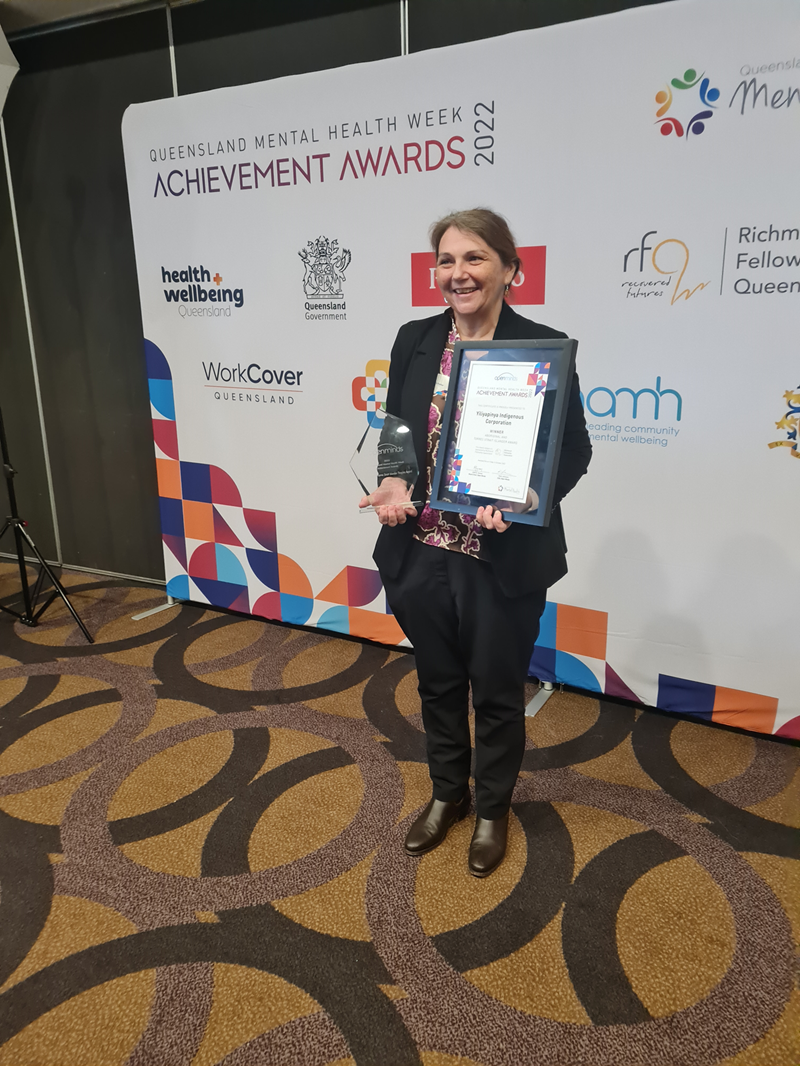Healthy brains for healthy lives
Yiliyapinya Indigenous Corporation is changing minds – literally – about supporting better health for Aboriginal and Torres Strait Islander people. When Aboriginal woman Sheryl Batchelor was a Queensland teacher (and later principal), she set out to find a better way to support children to learn. It was in those days that she read The Brain that Changes Itself by Norman Doidge MD, and was introduced to neuroplasticity. Neuroplasticity is a term used for the brain’s ability to reorganise itself by forming new pathways and connections, which can mean new ways of thinking.
From mental health to brain health and healing
Sheryl’s career shifted into community services. There, she was trained by neuroplasticity scientists and began to think about how this breakthrough could work for Aboriginal and Torres Strait Islander children.
If the brain changes in response to life events, then with the right approaches, it could change to heal itself and reduce symptoms of depression, anxiety and stress.
‘Yiliyapinya, which means brain, incorporates the practical applications of neuroscience into support services to improve brain health’, explains Sheryl.
For a child, better brain health can mean a better chance to comprehend and remember what they’re learning. And for a teacher, it means more patience and understanding, and a renewed passion for their work.
Breaking the mould to make it work
Sheryl knew neuroplasticity-based programs and strategies had the potential to make big and positive changes in Aboriginal and Torres Strait Islander people’s lives.
‘I wanted to set something up, but I didn’t know what it was. It was on the Murra Program at the University of Melbourne that I got together with other Indigenous businesses and that’s when I realised that what I wanted to do wouldn’t fit into the private sector. I wanted to work in a place where people didn’t have to pay.
‘I had to set up a not-for-profit. That course set me on a journey. I felt like my ancestors were pushing me towards this, but I didn’t know what to do.
‘I called ORIC and they really helped me. Through ORIC’s support, I ended up applying to set up Yiliyapinya.’ Under the CATSI Act, corporations must have a minimum of 3 directors and 3 board members, but Sheryl felt as the only person qualified to work in the field, she needed to go it alone.
She called ORIC who helped her to work through the rule book requirements and how to seek exemptions.
‘It’s unique because there’s no one else doing what I’m doing so I couldn’t get anyone else on board,’ Sheryl explains.
‘It took around 8 months to get this over the line. But ORIC kept working with me to get to where I wanted.’
As a result, Sheryl was able to create the corporation as the sole member and sole director. Her next challenge was to establish Yiliyapinya as a charity.
That was in 2019. Since she ‘got all the boxes ticked’, Sheryl and her team of 8 have been in high demand.

Yilyapinya won the Aboriginal and Torres Strait islander Peoples Award at the Queensland Mental Health Achievement Awards in 2022
Brain health is for everyone
Across the country, Yiliyapinya has supported better brain health through training and coaching the helping profession that supports children, youth, and families.
Sheryl says it’s important to work with the workforce to improve their own brain health so they can understand their own biases and, in turn, support a child’s wellbeing.
‘Anyone in the helping industry can benefit – feel less frustrated and more tolerant by improving their own cognitive, social and emotional wellbeing.’
A ripple of benefits
Yiliyapinya’s Deadly Brains playgroup is a supportive environment for parents to learn about brain health – for themselves and their children. It helps parents to bond with their children and take control of their family’s brain health at the same time.
‘If we don’t help parents to understand their own brain, how can they help their children?
‘We’re seeing parents become more confident in their own ability to parent – their confidence in dealing with their children has improved because they know they’re supported.’
Yiliyapinya’s team also supports young people who can’t have their educational needs met at mainstream or alternative schools. Most of these young people are in the child protection and/or youth justice system and most have not been to school for one to 3 years.
‘We’re supporting young people to break the cycle of crime by using neuroplasticity programs and strategies while in and out of detention to heal and strengthen their cognitive, social and emotions skills so that they can transition to school, training or into employment,’ says Sheryl.
‘We work with the child and every person they live with on getting a better connection to spirit.
‘We’re seeing kids getting back to school who haven’t been there for a very long time. We’re seeing a reduction in the number and severity of offences.
‘Kids are understanding their brains and understanding why it is they do what they do. They can then use a bit more self-control.
‘Meanwhile, the workforce is understanding how their brain impacts their ability to help other people.’
Changing the system from the inside out
Yiliyapinya continues to work directly with schools and the justice system. Now, Sheryl’s taking a new direction to shift the system from the inside out. She’s creating courses for people in the helping profession to learn how neuroplasticity can support them to work with vulnerable people.
‘We are coaching and supporting the system to promote and integrate brain health and healing conversations into their service delivery, policies, and procedures,’ explains Sheryl.
‘Let’s amplify this wonderful organ in our heads that we should be intrigued about!’